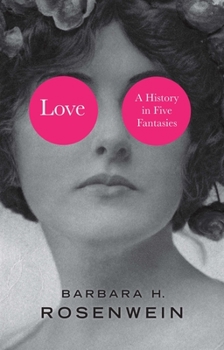Love: A History in Five Fantasies
We make sense of love with fantasies, stories that shape feelings that are otherwise too overwhelming, incoherent, and wayward to be tamed. For love is a complex, bewildering, and ecstatic emotion covering a welter of different feelings and moral judgements.
Drawing on philosophy, fiction, art, letters, memoirs, and evidence from everyday life, historian Barbara H. Rosenwein explores five of our most enduring fantasies of love: Like-minded union, transcendent rapture, selfless giving, obsessive longing, and insatiable desire. Each has had a long and kaleidoscopic history with lasting effects on how we in the West think about love today. Yet each leads to a different conclusion about what we should strive for in our relationships.
If only we could peel back the layers of love and discover its "true" essence. But love doesn't work like that; it is constructed on the shards of experience, story, and feeling, shared over time, intertwined with other fantasies. By understanding the history of how we have loved, Rosenwein argues, we may better navigate our own tumultuous experiences, and perhaps write our own scripts.





